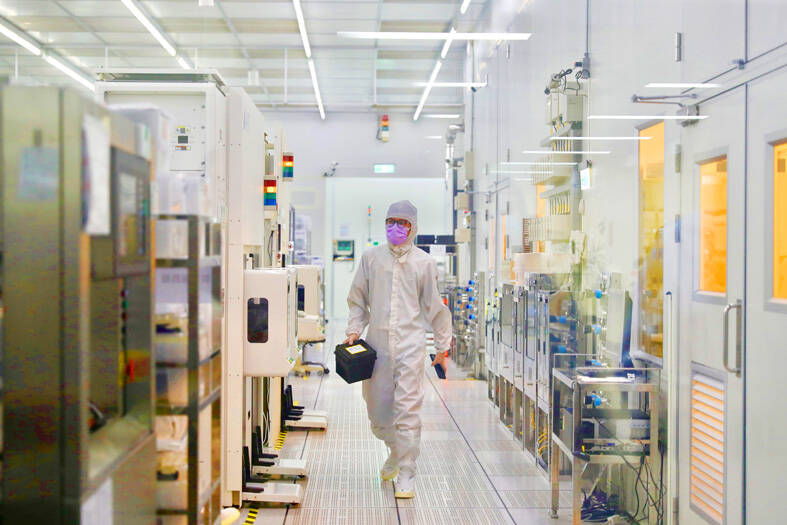Local suppliers of Taiwan Semiconductor Manufacturing Co (TSMC, 台積電) appear to be divided over whether they should follow the chipmaker and also set up production facilities in the US, after TSMC announced that it would increase its investment in Arizona.
While some TSMC suppliers, including clean-room design service provider United Integrated Services Co (漢唐集成), have set up plants in the US, others, such as IC testing and analysis provider Materials Analysis Technology Inc (閎康科技), have hesitated to make the move because of high production costs in the US.
TSMC on Tuesday announced that it would increase its planned US$12 billion investment in Arizona to US$40 billion to build a 3-nanometer fab, scheduled to begin operations in 2026, near its 4-nanometer fab, which is scheduled to start production in 2024.

Photo: Ritchie B. Tongo, EPA-EFE
Many TSMC suppliers had committed to following their biggest customer to the US well before the chipmaker announced its additional investment.
United Integrated Services said it has set up a subsidiary — United Integrated Services (USA) — to serve TSMC, to which it has provided integrated engineering system services since 1994.
The company said it provides services to TSMC facilities in the Hsinchu Science Park (新竹科學園區), the Central Taiwan Science Park (中部科學園區) and the Southern Taiwan Science Park (南部科學園區), and has been awarded as one of the chipmaker’s best suppliers.
Facility engineering turnkey project provider Marketech International Corp (帆宣) said it opened Marketech International Corp USA long before TSMC in May 2020 announced its plan to build an advanced semiconductor fab in Arizona.
It has doubled its team in the US to more than 100 specialists because of the TSMC move, Marketech said, adding that it is already profiting from the US expansion.
Its US subsidiary posted a profit of about NT$250 million (US$8.15 million) in the first nine months of this year, after securing orders from TSMC for work on its first Arizona fab, sharply up from a profit of NT$3.4 million for the whole of last year, Marketech said.
Mass flow controller and purifier supplier Taiwan Puritic Corp (和淞科技) said that although it only has paid-in capital of NT$600 million and sales of less than NT$10 billion a year, it still decided to follow TSMC to the US.
Taiwan Puritic in March last year set up a US subsidiary — Propersys Corp — after TSMC announced its Arizona investment plan.
Other suppliers have been more cautious.
Materials Analysis said the higher cost structure in the US is a major factor in its reluctance to set up a facility there.
It is unsure whether it would find workers with the needed skills in the US, it added.
Taiwan Speciality Chemicals Corp (台特化) has also been hesitant to invest in the US.
The company said it needed to see the economies of scale in the US market grow to a certain level before it might start production there, adding that it opened a warehouse in the US to handle and distribute its products made in Taiwan.

Intel Corp chief executive officer Lip-Bu Tan (陳立武) is expected to meet with Taiwanese suppliers next month in conjunction with the opening of the Computex Taipei trade show, supply chain sources said on Monday. The visit, the first for Tan to Taiwan since assuming his new post last month, would be aimed at enhancing Intel’s ties with suppliers in Taiwan as he attempts to help turn around the struggling US chipmaker, the sources said. Tan is to hold a banquet to celebrate Intel’s 40-year presence in Taiwan before Computex opens on May 20 and invite dozens of Taiwanese suppliers to exchange views

Application-specific integrated circuit designer Faraday Technology Corp (智原) yesterday said that although revenue this quarter would decline 30 percent from last quarter, it retained its full-year forecast of revenue growth of 100 percent. The company attributed the quarterly drop to a slowdown in customers’ production of chips using Faraday’s advanced packaging technology. The company is still confident about its revenue growth this year, given its strong “design-win” — or the projects it won to help customers design their chips, Faraday president Steve Wang (王國雍) told an online earnings conference. “The design-win this year is better than we expected. We believe we will win

Chizuko Kimura has become the first female sushi chef in the world to win a Michelin star, fulfilling a promise she made to her dying husband to continue his legacy. The 54-year-old Japanese chef regained the Michelin star her late husband, Shunei Kimura, won three years ago for their Sushi Shunei restaurant in Paris. For Shunei Kimura, the star was a dream come true. However, the joy was short-lived. He died from cancer just three months later in June 2022. He was 65. The following year, the restaurant in the heart of Montmartre lost its star rating. Chizuko Kimura insisted that the new star is still down

While China’s leaders use their economic and political might to fight US President Donald Trump’s trade war “to the end,” its army of social media soldiers are embarking on a more humorous campaign online. Trump’s tariff blitz has seen Washington and Beijing impose eye-watering duties on imports from the other, fanning a standoff between the economic superpowers that has sparked global recession fears and sent markets into a tailspin. Trump says his policy is a response to years of being “ripped off” by other countries and aims to bring manufacturing to the US, forcing companies to employ US workers. However, China’s online warriors